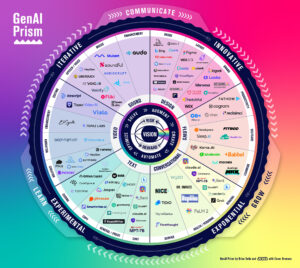
When we take pause to appreciate where we are, we can truly appreciate just how far we’ve come.
I recently stumbled across an interesting infographic as it made the rounds across the social web recently. Created by bestedsites.com, the graphic visualizes the meteoric rise of the Internet in just 10 years. For example, in 2002, the Internet boasted 569 million users, which represented 9.1% of the world population. In 2012, that number skyrocketed to 2.27 billion at 33% of the world population. Another tremendous stat is the daily time spent online. In 2002 it was only 46 minutes a day (that was probably the time it took to load one web site). In 2012, it’s clocked four hours a day.
As I was reveling in the rapid evolution and ascent of the internet in general, I took stock of Facebook’s growth. Well, I suppose not literally. Looking at Facebook as a subset of this particular infographic would provide a visual comparison of the static and social web. I once wrote that to the connected consumer, the end of the destination web was upon us. The flow of information has been disrupted. While websites aren’t dead they certainly don’t meet the needs and expectations of a much more real-time audience who live in their egosystem and benefit from news and information finding them. We live in an era where news no longer breaks, it Tweets. As such, I’d love to see a visual comparison of the destination and social web and the numbers between them.
In 2011, Facebook was the size of the Internet in 2004
That’s certainly a dramatic headline. And, it’s true. Last year, when Facebook hit 800 million users, Royal Pingdom reported that not only was the milestone significant in terms of user base, it was the size of the entire Internet in 2004.
In July 2012, Facebook reported that its user count was approaching 1 billion with 955 million active users and counting. Those numbers are almost too big to truly grasp. So, I again took pause.
In 2004, thefacebook launched for Harvard University students. Within 24 hours, thefacebook was already home to somewhere between 1,200 and 1,500 students according to co-founder Dustin Moskovitz. Within the first month, more than half of all Harvard students were registered. By October 2005, “the” was dropped from the company name, Facebook.com was purchased for $200,000, Sean Parker was now the company president, Facebook moved to Palo Alto, and the company opened the network to universities around the world.
Over the course of eight years, the site continued to experience incredible growth, a story of which you’re more than familiar with today.
Here’s a timeline representing milestones for each jump of 100 million users:
August 26, 2008 = 100 million users
April 8, 2009 =200 million users
September 15, 2009 = 300 million
February 5, 2010 = 400 million
July 21, 2010 = 500 million
January 5, 2011 = 600 million
May 30, 2011 = 700 million
September 22, 2011 = 800 million
April 24, 2012 = 900 million
Now (August 2012) = 955 million users
CNET recently reported that as many as 8.7 percent of users are fake. Just to clarify, not fake as in shallow personalities, but fake as in bogus accounts that represent duplicates, misclassified, undesirable, spam, etc. But event at 8.7 percent, the the overall number of people who use Facebook in one way or another is staggering. It is its own Internet and that’s both frightening and fascinating.
My colleagues at Altimeter Group Andrew Jones (@andrewjns), Christine Tran (@christineptran) and I took a look at the numbers to plot them on the infographic to truly visualize how big Facebook really is.
Accounting for the 8.7% of fake accounts, Facebook represents 28% of all Internet users at ~12% of the world’s population (estimated at 7 billion).
Some day, I’d love to see Facebook, Twitter, Youtube, the Internet overall, side by side to show the different behaviors in information flow. Please feel free to share any numbers or infographics you’ve created that expand on this story.
Connect with me: Twitter | LinkedIn | Facebook | Google+
The End of Business as Usual is officially here…







Amazing #Facebook!
Only 10% fake? They must be just counting all of mine…
Real-time rules all! But where do we go from here? When thinking of networked systems within the Internet space, I wonder how we will manage all the multitude of connections and further engage audiences. If Facebook represent 12% of the world’s population now, what will the reach look like in 5 yrs and what will those users want from us brands? What will become of destination websites for business? How will e-commerce change as we go from individual portals to greater and greater aggregated systems.
Yes, I realize those are all questions and no answers, but I feel like we’re riding a rover named Curiosity.
All great questions and some of them have answers today. We are managed a distributed presence, but also think about delivering a holistic and optimized experience that keeps the brand and the outcomes in tact, distributed, and integrated at the same time. #curiosity
Meagan Dahl, it’s a good question!
Huge. Boring. Necessary. That’s why Facebook isn’t going anywhere.
All the cool kids are on Tumblr but there’s less creatives and more regulars out there.
And what of the new Myspace, “A place for creatives…”? Interesting time…
Sure, mainly musician creatives but mostly inactive ones. MySpace now just a wasteland of Pinteresque design.
The other thing I like about Facebook, is that you can put up a Facebook Fan page in a few minutes.
You also get feedback from Facebook Pages, ordinary websites, appear static.
No stats, but imho a few years ago people spent a lot of time on ebay. now they are spending that time on Facebook.
And you ones don’t email you they say they’ll Facebook you.
4 hours per day? Is anyone working?
Yes, people are just replacing TV time with Internet time.
Or doing both at the same time. #multitasking
it’s really unbelievable that how things have changed within last few years that the revolution of social marketing as well as booming online audiences around the world who are the most influential and key players. And inclusion of smart phones also drive internet users growth more than ever before.
Has anyone out there ever heard of…Google? Google´s figures are far more impressive.
Why just compare with Facebook? That won´t get FB stock quotes up anyway…
AOL/TimeWarner 😉
FaceBook is a Great Book !
“While websites aren’t dead they certainly don’t meet the needs and expectations of a much more real-time audience who live in their egosystem and benefit from news and information finding them.” this is very true. The serendipity has in some circles won over search. I still value both but in the current social web, it is all about the news you get from twitter, facebook and other media. The facebook stats are very impressive but there are also some impressive numbers from other social media sites in China (eg. Tencent) that rivals some of their western counterpart.